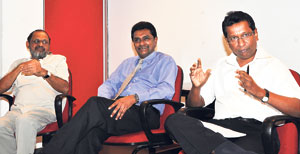Business Times Panel
Discussion
The Business Times Panel Discussion is a regular feature, once a month, where two to three experts are invited to discuss a particular topic that is of national, economic or social interest. |
Elections add up to billions of rupees in direct costs, but also run up massive, uncalculated hidden costs that eat into the country’s future economic growth, say a group of experts.
Legal experts maintain that elections are not just a routine part of the democratic process but are also a human right of the people of Sri Lanka.
“Elections are part of international human rights, under the ICCPR (International Covenant on Civil and Political Rights). The ICCPR provides for ‘genuine’ elections where people can freely decide,” said the Executive Director of Transparency International Sri Lanka (TISL), J C Weliamuna, speaking at the Business Times Panel Discussion on Thursday at the auditorium of Wijeya Newspapers Ltd (WNL) this week, on Election Costs.

Panellists: From left - Sunil Bastian , Ranel Wijesinha and J. C. Weliamuna. Pic by Gemune Wellage |
Elections, as a part of democratic governance, are even linked with national prosperity. “Nobel Laureate, Professor Amartya Sen, in his study of famines in countries, found that countries with democratic governance and a relatively free press, don’t suffer from significant food shortages. These are countries that facilitate democracy through fair elections and have a free media,” said Mr Weliamuna.
Sri Lankan governments are noted for their enthusiasm in facilitating democracy through elections. In fact, Sri Lankan governments are accused of being too enthusiastic about holding elections - if not actually facilitating democracy. After a string of local government elections, Sri Lanka is now transiting through a heated Presidential Election, towards a general election. Observers say this fixation on elections is a peculiarity of Sri Lankan democracy.
“The Sri Lankan democratic system has its own peculiarities and the number of elections is a peculiar element of the Sri Lankan political system. We have a lot of democratic institutions but not democratic politics. The people’s desire for development, by getting roads and bridges and whatever else, through the election process, is also part of this,” according to Researcher and Development Consultant, Sunil Bastian.
High cost
These ‘peculiarities of Sri Lankan democracy’ cost the Sri Lankan public a great deal of money. The current Presidential Election is estimated to cost up to Rs 10 billion in total, including the expenditure incurred by the candidates.
However, these estimates do not factor in all the hidden costs. Financial experts say these hidden costs include opportunity costs that retard the future growth potential of the country.
“Election expenditure is consumption expenditure, at the cost of investment expenditure. What many people don’t realise, is the opportunity cost to the country from frequent elections. This is very significant for an emerging economy like Sri Lanka,” says management consultant and a former President of the Institute of Chartered Accountants, Ranel T. Wijesinha.
These opportunity costs at election times range from the delays faced by Sri Lankan citizens in getting their work done through government agencies, to investment losses running into millions of dollars.
Over the years, Sri Lanka has scared-off many large foreign investments into other countries, because of corruption and inefficiencies related to local elections. Investments by local investors have also been postponed or dropped.
The value of these losses is not limited to the value of the lost investments, but also include lost job opportunities and lost quality of life improvement opportunities for a people.
Uncalculated opportunity costs also include ‘promised costs,’ that are part of the Sri Lankan election culture of buying votes.
“The promised spending comes on top of the direct election expenditure. These are the promises that lock-in the government’s future spending. These include costs like salary increases, subsidies and other costs that the government introduces just before elections. These are funds committed into the future and they can’t be re-allocated elsewhere, even in a more efficient way, once they are committed,” says Mr Wijesinha.
Such allocations of government funds, without a development focus, eat into Sri Lanka’s economic growth potential.
A more disciplined election culture, enforced through wider-public participation, noted the panel of experts, can reduce both direct and hidden costs of elections.
Public participation, where the general public act as whistleblowers, can also control the large scale corruption and abuse of public assets by incumbent governments during elections.
The current Presidential Election has been particularly noted by election analysts for unparalleled abuse of public property by the government. |

